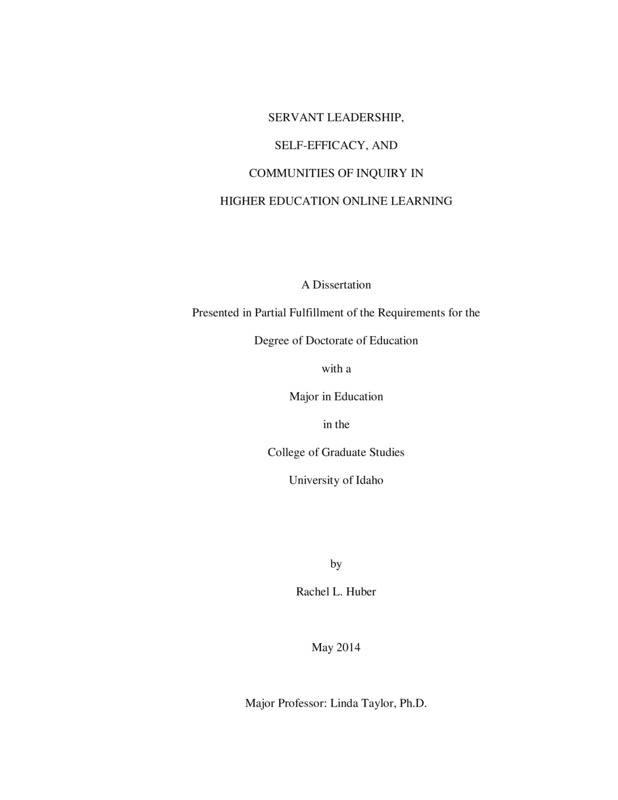Servant Leadership, Self-Efficacy, and Communities of Inquiry in Higher Education Online Learning
Huber, Rachel. (2014). Servant Leadership, Self-Efficacy, and Communities of Inquiry in Higher Education Online Learning. Theses and Dissertations Collection, University of Idaho Library Digital Collections. https://www.lib.uidaho.edu/digital/etd/items/huber_idaho_0089e_10174.html
- Title:
- Servant Leadership, Self-Efficacy, and Communities of Inquiry in Higher Education Online Learning
- Author:
- Huber, Rachel
- Date:
- 2014
- Keywords:
- andragogy Communities of Inquiry higher education online learning Self-Efficacy servant leadership
- Program:
- Curriculum & Instruction
- Subject Category:
- Education; Adult education; Educational technology
- Abstract:
-
This three-article dissertation explored various aspects of improving the quality of online teaching. Chapter Two was a quantitative study, and investigated the relationship between online instructor self-efficacy and student satisfaction at a private university in the northwestern United States. Chapter Three was a multiple case study which investigated how teachers who are familiar with servant leadership principles perceive servant leadership traits as able to transition to and have influence in the higher education online classroom. It identified what online learning looks like when the teacher uses the servant leadership model. In addition, the presence of mentoring in servant teacher online courses was established, and servant leadership was recommended as an effective pedagogical approach for higher education online learning. Chapter Four investigated the relationship between servant leadership training and instructor self-efficacy in terms of technology, pedagogy, and subject matter. This data was compared with teaching presence, cognitive presence and social presence (as measured by the CoI) in higher education online learning to identify any correlations. Chapter Five tied the three research articles together, concluding that servant leadership is an effective pedagogical approach with similarities with best practices and principles of andragogy. When teachers are trained and online programs are developed using a foundation of servant leadership principles, the result is increased mentoring, more effective online instruction, and increased satisfaction and success for students.
Keywords: online learning, servant leadership, self-efficacy, Community of Inquiry, higher education
- Description:
- doctoral, D.Ed., Curriculum & Instruction -- University of Idaho - College of Graduate Studies, 2014
- Major Professor:
- Taylor, Linda
- Committee:
- Mantle-Bromley, Corinne; Dixon, Raymond; Kimmons, Royce
- Defense Date:
- 2014
- Identifier:
- Huber_idaho_0089E_10174
- Type:
- Text
- Format Original:
- Format:
- application/pdf
- Rights:
- In Copyright - Educational Use Permitted. For more information, please contact University of Idaho Library Special Collections and Archives Department at libspec@uidaho.edu.
- Standardized Rights:
- http://rightsstatements.org/vocab/InC-EDU/1.0/

